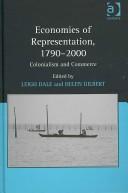| Listing 1 - 8 of 8 |
Sort by
|

ISBN: 0754662578 9786611207991 1281207993 0754682463 1351159224 9780827786896 1351159240 081538873X 1351159232 0367892995 9780754682462 9780754662570 100306342X 9781351159234 9781351159210 1351159216 Year: 2007 Publisher: Aldershot : Ashgate,
Abstract | Keywords | Export | Availability | Bookmark
 Loading...
Loading...Choose an application
- Reference Manager
- EndNote
- RefWorks (Direct export to RefWorks)
"Although postcolonialism has emerged as one of the most significant theoretical movements in literary and cultural studies, it has paid scant attention to the importance of trade and trade relations to debates about culture. Focusing on the past two centuries, this volume investigates the links among trade, colonialism, and forms of representation, posing the question, 'What is the historical or modern relationship between economic inequality and imperial patterns of representation and reading?' Rather than dealing exclusively with a particular industry or type of industry, the contributors take up the issue of how various economies have been represented in Aboriginal art; in literature by North American, Caribbean, Portuguese, South African, First nation's, Australian, British, and Aboriginal authors; and in a diverse range of writings that includes travel diaries, missionary texts, the findings of the Leprosy Investigation Commission, early medical accounts and media representations of HIV/AIDS. Examining trade in commodities as various as illicit drugs, liquor, bananas, tourism, adventure fiction, and modern Aboriginal art, as well as cultural exchanges in politics, medicine, and literature, the essays reflect the widespread origins of the contributors themselves, who are based throughout the English-speaking world. Taken as a whole, this book contests the commonplace view promoted by some modern economists-that trade in and of itself has a leveling effect, equalising cultures, places, and peoples-demonstrating instead the ways in which commerce has created and exacerbated differences in power."--Provided by publisher.
English literature --- Colonies in literature. --- Commerce in literature. --- Capitalism in literature. --- History and criticism. --- Colonies --- Commerce --- History. --- Social aspects. --- Trade --- Economics --- Business --- Transportation --- Anti-colonialism --- Colonial affairs --- Colonialism --- Neocolonialism --- Imperialism --- Non-self-governing territories --- Colonization
Book
ISBN: 9780367892999 9780815388739 Year: 2019 Publisher: London Routledge, Taylor & Francis Group
Abstract | Keywords | Export | Availability | Bookmark
 Loading...
Loading...Choose an application
- Reference Manager
- EndNote
- RefWorks (Direct export to RefWorks)
"Although postcolonialism has emerged as one of the most significant theoretical movements in literary and cultural studies, it has paid scant attention to the importance of trade and trade relations to debates about culture. Focusing on the past two centuries, this volume investigates the links among trade, colonialism, and forms of representation, posing the question, 'What is the historical or modern relationship between economic inequality and imperial patterns of representation and reading?' Rather than dealing exclusively with a particular industry or type of industry, the contributors take up the issue of how various economies have been represented in Aboriginal art; in literature by North American, Caribbean, Portuguese, South African, First nation's, Australian, British, and Aboriginal authors; and in a diverse range of writings that includes travel diaries, missionary texts, the findings of the Leprosy Investigation Commission, early medical accounts and media representations of HIV/AIDS. Examining trade in commodities as various as illicit drugs, liquor, bananas, tourism, adventure fiction, and modern Aboriginal art, as well as cultural exchanges in politics, medicine, and literature, the essays reflect the widespread origins of the contributors themselves, who are based throughout the English-speaking world. Taken as a whole, this book contests the commonplace view promoted by some modern economists-that trade in and of itself has a leveling effect, equalising cultures, places, and peoples-demonstrating instead the ways in which commerce has created and exacerbated differences in power."--Provided by publisher.
Thematology --- English literature --- anno 1800-1899 --- anno 1900-1999
Book
ISBN: 9789004484931 9789042007536 Year: 1998 Publisher: Leiden;Boston BRILL
Abstract | Keywords | Export | Availability | Bookmark
 Loading...
Loading...Choose an application
- Reference Manager
- EndNote
- RefWorks (Direct export to RefWorks)
The body is increasingly understood as being at the centre of colonial and post-colonial relationships and textual productions. Creating and circulating images of the undisciplined body of the 'other' was and is a critical aspect of colonialism. Likewise, resistance to colonial practices was also frequently corporeal, with indigenous peoples appropriating, parodying, and subverting those European practices which were used to signify the 'civilized' status of the colonizing body. The Body in the Library reads representations of the corporeal in texts of empire; case studies include: • gendered representations of corporeality • medical régimes • ethnography and photography in the Pacific • cultural transvestism in theatre • disease and colonial knowledge generation • 'freak shows' and colonial exhibits • cinematic representations of bodies • geography and the metaphorization of land as a penetrable body • marketing the body • organ transplants and the limits of the post-colonial paradigm In viewing colonialism and resistance as a bodily phenomenon, The Body in the Library enables new perspectives on the process of colonization and resistance. It is an important resource for teachers and students of colonial and post-colonial literatures.
Human body in literature --- Human body --- Social aspects --- Cross-cultural studies

ISBN: 9042007532 9004484930 Year: 1998 Publisher: Amsterdam : Rodopi,
Abstract | Keywords | Export | Availability | Bookmark
 Loading...
Loading...Choose an application
- Reference Manager
- EndNote
- RefWorks (Direct export to RefWorks)
Australian drama --- Lawson (henry) --- Post-colonial theory
Book
ISBN: 9004376542 9004376534 Year: 2018 Publisher: Leiden ; Boston : [Brill],
Abstract | Keywords | Export | Availability | Bookmark
 Loading...
Loading...Choose an application
- Reference Manager
- EndNote
- RefWorks (Direct export to RefWorks)
In Postcolonial Past andamp; Present twelve outstanding scholars of literature, history and visual arts look to those spaces Epeli Hau’ofa has insisted are full not empty, asking what it might mean to Indigenise culture. A new cultural politics demands new forms of making and interpretation that rethink and reroute existing cultural categories and geographies. These ‘makers’ include Mukunda Das, Janet Frame, Xavier Herbert, Tomson Highway, Claude McKay, Marie Munkara, Elsje van Keppel, Albert Wendt, Jane Whiteley and Alexis Wright. Case studies from Canada to the Caribbean, India to the Pacific, and Africa, analyse the productive ways that artists and intellectuals have made sense of turbulent local and global forces. Contributors: Bill Ashcroft, Debnarayan Bandyopadhyay, Anne Brewster, Diana Brydon, Meeta Chatterjee—Padmanabhan, Anne Collett, Dorothy Jones, Kay Lawrence, Russell McDougall, Tekura Moeka’a, Tony Simões da Silva, Teresia Teaiwa, Albert Wendt, Lydia Wevers, Diana Wood Conroy
Cultural geography --- Pacific Island fiction (English) --- English fiction --- Oceanian fiction (English) --- Pacific Island literature (English) --- Human geography --- History and criticism. --- Sharrad, Paul. --- Oceania --- Social life and customs. --- Civilization.
Book
Year: 2014 Publisher: Durham (N.C.): Duke university press,
Abstract | Keywords | Export | Availability | Bookmark
 Loading...
Loading...Choose an application
- Reference Manager
- EndNote
- RefWorks (Direct export to RefWorks)
Book
ISBN: 9789004376533 9789004376540 Year: 2018 Publisher: Leiden ;Boston [Brill]
Abstract | Keywords | Export | Availability | Bookmark
 Loading...
Loading...Choose an application
- Reference Manager
- EndNote
- RefWorks (Direct export to RefWorks)
In Postcolonial Past & Present twelve outstanding scholars of literature, history and visual arts look to those spaces Epeli Hau'ofa has insisted are full not empty, asking what it might mean to Indigenise culture. A new cultural politics demands new forms of making and interpretation that rethink and reroute existing cultural categories and geographies. These 'makers' include Mukunda Das, Janet Frame, Xavier Herbert, Tomson Highway, Claude McKay, Marie Munkara, Elsje van Keppel, Albert Wendt, Jane Whiteley and Alexis Wright. Case studies from Canada to the Caribbean, India to the Pacific, and Africa, analyse the productive ways that artists and intellectuals have made sense of turbulent local and global forces.
Cultural geography --- Pacific Island fiction (English) --- History and criticism. --- Sharrad, Paul. --- Oceania --- Social life and customs. --- Civilization.
Book
ISBN: 0646311611 Year: 1997 Publisher: Canberra : Association for the Study of Australian Literature,
Abstract | Keywords | Export | Availability | Bookmark
 Loading...
Loading...Choose an application
- Reference Manager
- EndNote
- RefWorks (Direct export to RefWorks)
English literature --- Nationalism and education --- Imperialism in literature --- Literature and society --- Littérature anglaise --- Littérature et société --- Nationalisme et éducation --- Impérialisme --- Vie intellectuelle --- Study and teaching (Higher) --- History. --- Étude et enseignement (supérieur) --- Histoire. --- Dans la littérature --- Colonies britanniques --- Australia --- Great Britain --- Intellectual life --- Colonies
| Listing 1 - 8 of 8 |
Sort by
|

 Search
Search Feedback
Feedback About UniCat
About UniCat  Help
Help News
News